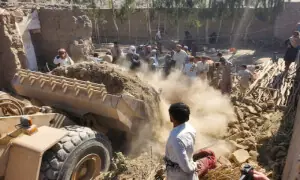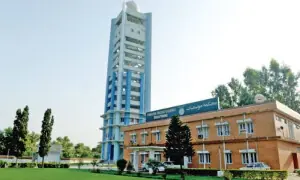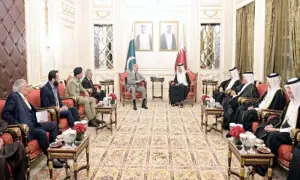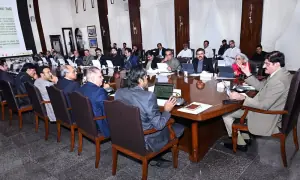The Maulana of Gwadar’s got game
4 min readWhile you were not looking, a man called the Maulana of Gwadar did something quite marvelous. He single-handedly creamed the big guns in Balochistan’s local government elections last week—clean knocked the entire hyphenated lot out of the park.
His actual name is Maulana Hidayat-ur-Rehman and he was voted to power in 40% of Gwadar’s 157 wards, beating the four-party alliance of the Jamiat Ulema-e-Islam-Fazlur Rehman, Balochistan National Party-Mengal, National Party, and Pakistan National Party-Awami.
To give you a sense of the magnitude of his electoral chops, he won in 60 out of the 157 wards, according to the unofficial results. The final results will be made public on June 3.
The numbers for the other major parties were nothing to write home about:
- Gwadar Rights Movement = 60 (of Maulana of Gwadar)
- Independents = 56
- BNP (Mengal) = 30
- National Party = 7
- JUI-F = 1
- Total = 157* *No polls held in 3 wards (Sheikh Umar, Imam Bux, Master Khuda Bux. There was one registered voter in Sheikh Umar ward, 11 in Imam Bux, and six in Master Khuda Bux ward)
Wards are smaller parts of Union Councils and Municipal Committees. Union councils are for up to 50,000 people in rural areas. Municipal Committees are for larger settlements for up to 300,000 folks. Gwadar has 157 wards which become 4 Municipal Committees and 13 Union Councils.
“The nation, especially the youngsters, has shunned the old group that has been ruling Gwadar for the last forty years and reposed their trust in me,” Maulana Hidayat-ur-Rehman told Aaj News over the phone on Tuesday. “They came out on the streets on my call and they voted for me in the polls on my call.”
He is referring to the momentum built from last November when he started a protest called ‘Gwadar ko Haq do’. Never before had so many women and children staged a sit-in that lasted nearly a month.
“We have only received check posts in the CPEC project,” he had boldly said in a video message last year. “We [the people of Gwadar] are not demanding motorways in CPEC, neither are we asking for metaled roads… all we ask for is a halt to the trawling mafia and free access to the sea like before.”

The Maulana of Gwadar comes from three generations of fishermen, so he knows only too well how illegal trawlers scrape the bottom of the ocean with wire nets, killing fish offspring along the coast. Catch has dwindled and by extension livelihoods. The second demand during the November protest was against the construction of a 19km East-Bay expressway cutting fishermen from the east side of the hammerhead which they had freely accessed for generations.
This stance won him support from the people of Gwadar, who were disillusioned with nationalist politicians who had done little to bring up their problems after being sent by ballot to Islamabad. And so the Gwadar Rights Movement won 27 out of 42 seats in Municipal Committees.
Before emerging as a leader, Hidayat-ur-Rehman was a Jamaat-e-Islami general secretary in the port city, and he says he is sticking with the party. This is important because it departs from a long tradition of nationalist politics on this turf. Religious parties never really had skin in the game in Balochistan—with the exception of the JUI-F in the Pashtun belt.
With JI Hidayat’s success, now though, the JUI-F is suddenly having to wonder if it needs to worry about the religious Jamaat-e-Islami inching in on its turf. Nationalist parties are wary for their own reasons: Hidayat-ur-Rehman’s rise is being eyed with skepticism and fear that undemocratic forces might be supporting him. How could someone sweep an election when no one really knew his name over a year ago?
The Maulana dismisses the notion. “I only have the support of the people and of God,” he told Aaj News. “Those who make such allegations have themselves been supported by such powers in the province in the past that placed them in the assemblies.”
Such a conspiracy theory would normally bear up in Balochistan. Sudden success at the ballot box usually means someone offered a helping hand to stuff it. But one factor corroborates the Maulana of Gwadar’s democratic success as genuine: the voter sentiment shown for Independents, aside from him. The people of Gwadar voted in more party-less candidates (56 wards) than those of any political party. They are simply fed up of the old guard.
Local government elections are the testing ground for anyone with political ambitions in Pakistan. If you make it in on this round, you can start punching above your weight when the general elections roll around—and the Maulana of Gwadar most surely has plans to stand.
For the latest news, follow us on Twitter @Aaj_Urdu. We are also on Facebook, Instagram and YouTube.

























Comments are closed on this story.